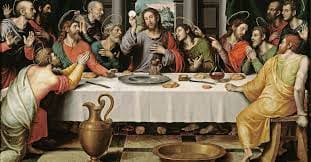
Thanks for What Exactly? : A Reflection on Genocide, Enslavement, and Christianity’s Role by Brent Simon
Thanksgiving, often portrayed as a benign celebration of gratitude and unity, carries a much darker legacy rooted in colonial violence, genocide, and the exploitation of enslaved peoples. While modern narratives focus on feasting and family, the holiday’s origins and historical context reveal a story of conquest and brutality. For Black people in the diaspora, including those in Antigua, Thanksgiving offers an opportunity for critical reflection on the shared legacies of Indigenous genocide, African enslavement, and the Church’s complicity in these atrocities. By confronting this history, we can challenge the myths that obscure systemic oppression and reclaim space for truth and justice.
The origins of Thanksgiving are often linked to the 1621 harvest feast shared by the Pilgrims and the Wampanoag people. However, a more accurate starting point for the holiday lies in the Mystic Massacre of 1637, a horrific event during the Pequot War.
The Pequot people, a powerful Indigenous group in present-day Connecticut, resisted English settlers’ attempts to seize their land and dominate the fur trade. On May 26, 1637, English colonists, led by Captain John Mason, allied with the Narragansett and Mohegan tribes, launched a surprise attack on a Pequot village near the Mystic River. The English set the fort on fire, killing an estimated 400–700 Pequot people—primarily women, children, and the elderly—as they tried to escape. Survivors were enslaved or executed.
The English colonists viewed this massacre as a divine victory, celebrating it with a “day of thanksgiving” to their God. Subsequent Thanksgiving proclamations in colonial New England marked similar violent victories over Indigenous peoples, framing genocide as a moral triumph and erasing the humanity of the victims.
The colonial violence that shaped Thanksgiving’s origins mirrors the history of Antigua, where British settlers violently displaced Indigenous populations and established systems of African enslavement. Much like the Pequot in New England, Indigenous Caribbean peoples such as the Arawaks and Caribs were decimated by European diseases, warfare, and forced labor during early colonization.
When the Indigenous populations were nearly wiped out, European colonists turned to the transatlantic slave trade to meet their labor demands. Antigua became a hub for sugar production, with enslaved Africans forced to work under brutal conditions. The parallels between the Mystic Massacre and Antigua’s plantation economy are clear: both involved the dehumanization of entire populations to fuel European expansion and wealth.
Christianity played a central role in justifying the atrocities committed during colonization. Religious doctrines framed the conquest of Indigenous peoples and the enslavement of Africans as divinely ordained, providing moral cover for acts of violence and oppression.

The “Doctrine of Discovery,” a series of Papal Bulls issued in the 15th century, granted European Christian nations the right to claim non-Christian lands and enslave their inhabitants. This ideology underpinned both the Mystic Massacre and the establishment of plantation economies in Antigua. The Puritans viewed their victory over the Pequot as evidence of God’s favor, celebrating massacres as divine triumphs. Churches reinforced these narratives, holding special services to thank God for the settlers’ “successes. In the Caribbean, Christianity was used to justify the enslavement of Africans. Missionaries taught that slavery was part of God’s plan and emphasized obedience to enslavers as a Christian virtue. Plantation churches in Antigua became tools of social control, indoctrinating enslaved Africans while reinforcing their subjugation.
The Church also celebrated the suppression of resistance. In Antigua, after the failed 1736 rebellion led by Prince Klaas, churches framed the executions of rebel leaders as a victory for Christian civilization, mirroring the Puritans’ thanksgiving celebrations after massacres. By embedding these atrocities in religious doctrine, the Church played an active role in legitimizing genocide and slavery, sanctifying acts of violence while profiting from the colonial system.
For Black people in Antigua and the diaspora, the history of Thanksgiving resonates deeply with their own experiences of colonial violence. The systemic exploitation of Indigenous peoples and Africans was justified by the same ideologies of racial and cultural superiority. Both groups were treated as obstacles to European progress, their labor and lands seized to build the wealth of empires.
Thanksgiving, as it is traditionally celebrated, erases these shared histories of resistance and resilience. For Indigenous peoples, it is a National Day of Mourning, a time to reflect on the genocide and cultural erasure they endured. For Black communities, it can be a moment to confront the intertwined legacies of slavery and colonialism, challenging the myths that uphold systemic oppression.
Rather than uncritically celebrating Thanksgiving, Black and Indigenous peoples can use the day as an opportunity for reflection, solidarity, and activism.
We must acknowledge the true history of Thanksgiving, from the Mystic Massacre to the enslavement of Africans in Antigua, ensuring these stories are told and remembered. We must build alliances between Black and Indigenous communities to resist ongoing colonialism and advocate for justice.We must hold institutions like the Church accountable for their roles in legitimizing and profiting from genocide and slavery and push for reparative actions that address these historical wrongs. We must reclaim our culture and celebrate the resilience of our ancestors who survived and resisted oppresion. We must reclaim the day as one of reflection and empowerment, rooted in the rich cultural traditions of Africans and Indigenous peoples.
Thanksgiving is not simply a harmless holiday; it is a symbol of colonial violence and the erasure of marginalized histories. The broader systems of genocide and slavery demand critical reflection. By confronting these truths, we can challenge the myths that obscure systemic oppression and reclaim the narrative, transforming Thanksgiving into a day of remembrance, resistance, and hope for a more just future.
Advertise with the mоѕt vіѕіtеd nеwѕ ѕіtе іn Antigua!
We offer fully customizable and flexible digital marketing packages.
Contact us at [email protected]
















Crying about US Thanksgiving now… Yawn… 🥱 Did you write a piece the day before Canadian Thanksgiving too? Man, move on with your life and enjoy it or simply fuck off.
Christianity has touched virtually every part of life. Over the centuries, the Church has founded schools, hospitals and orphanages; Christians have campaigned for prison reform, better housing and an end to the slave trade; they have helped to establish a huge number of charities to support the poor, the underprivileged, prisoners and their families, the homeless and those seeking justice. Christians were involved in setting up many of the best-known charities including Oxfam, the Salvation Army, the Samaritans and the RSPCA
Remarkably, a number of famous football clubs can trace their origins back to efforts by the Church to establish sports teams in the late 19th century.
Women are freer and more empowered in countries that embrace Christianity and general economic conditions are better as well.
This is not to say horrible things have not been done under the guise of Christianity (hence the birth of the Protestant movement). I would say let’s not throw out the baby with the bathwater but…even that is a debate these days.
WELL SAID!
2 Timothy 3:1-3 This know also, that in the last days perilous times shall come.
2 For men shall be lovers of their own selves, covetous, boasters, proud, blasphemers, disobedient to parents, UNTHANKFUL, unholy,
3 Without natural affection, trucebreakers, false accusers, incontinent, fierce, despisers of those that are good,
4 Traitors, heady, highminded, lovers of pleasures more than lovers of God;
I wonder, if the author was as vocal in condemning the atrocities shocked the nation in early August by certain lovers of pleasure?
Thanks for sharing the history with us. Recently I’ve read a lot of the history of the western hemisphere and European colonisation of Africa, Asia and the Pacific. It is surprising and shocking, and makes me rethink my attitudes to many institutions and practices I have grown up in.
This piece is not only well written, but is also replete with The Truth. I have no white god, no teach me anything wrong
Antigua ppl really NUFF & EDGE UP!!!! Since when we start to “celebrate” US holidays. Now hearing ads on the radio for “black Friday sales”
Well sah what a set a nuff edge up neargah
Antiguan people don’t celebrate Thanksgiving, why are Antiguan people always crying about stuff that doesn’t concern them and not issues on this CRAPPY LITTLE ISLAND????? I FORGOT, THAT’S ALL THESE DUMMIES DO IS COMPLAIN ABOUT IRRELEVANT STUFF….
@old man in old road
What triggered you?
The writer did nothing but quote facts.
@Consider Yeah, they did all that after kidnapping and raping us.
We were forced to become “Christians” to enroll in these schools.
F*ck Jesus and his mother, Mary.
Jesus never promoted violence or slavery, quite the opposite, neither did the original Christian church. Some humans possibly tried to justify slavery and greed using Christianity but on the other hand others ended slavery in the name of true Christianity. The “Church” is different people over different generations. Blaming the current “Church” for atrocities centuries ago is pointless. The people in the church today are quite aware of right or wrong in situations such as slavery today and actively fight to free persons even today. On the other hand, let’s not brownwash history and pretend that every indigenous or non-Christian society was innocent and virtuous in the past. There were people groups in this world who practiced atrocious such as child sacrifice to their “gods”. If Christians fought them off, took over the land, and taught them better in those scenarios that would not have been a bad thing. We weren’t there. So, we don’t really know who was good or bad in the past. Best not to get worked up misjudging people from the past for things we weren’t there to witness for ourselves or blaming current institutions for crimes of people in the past. Life goes on. Move on in peace.
@pause to ponder
WELL SAID!
Great answer Consider
https://www.youtube.com/watch?v=99fmQYXnwdA&t=6s
Comments are closed.